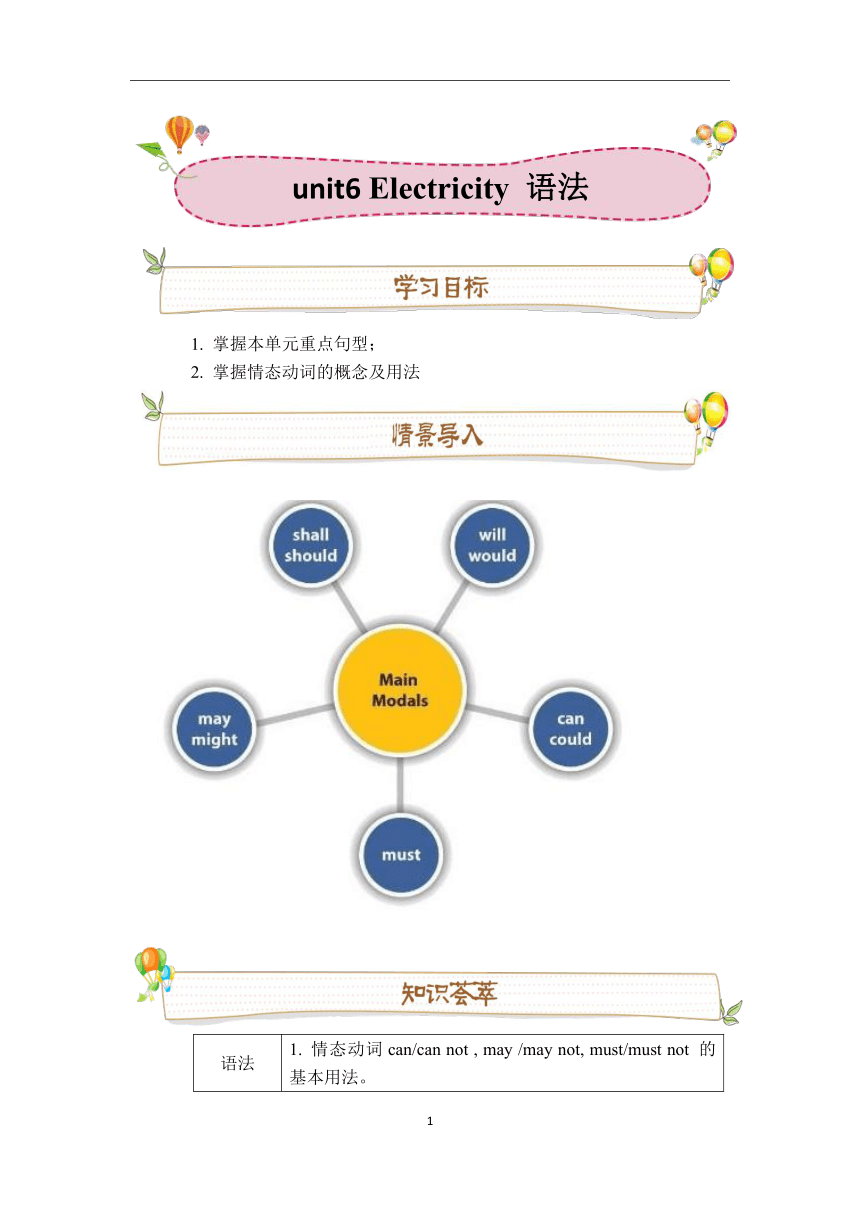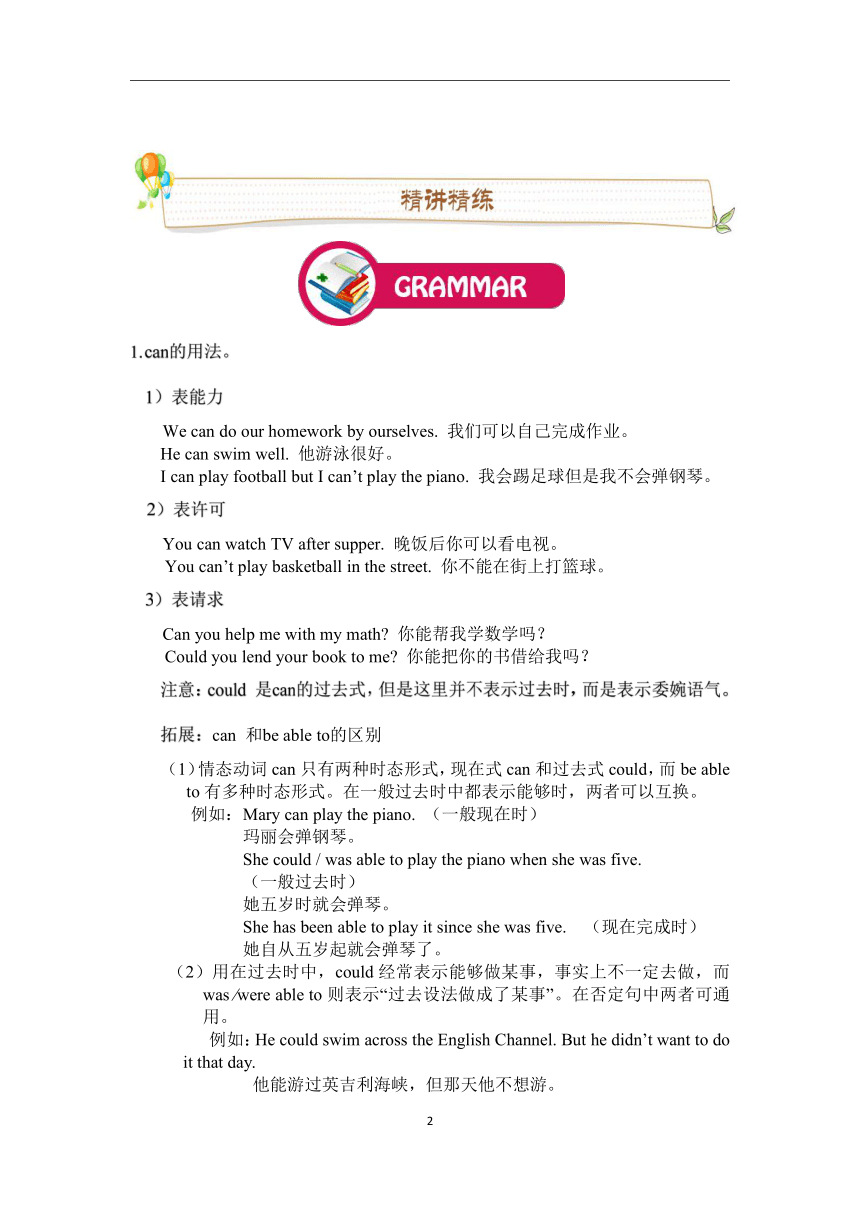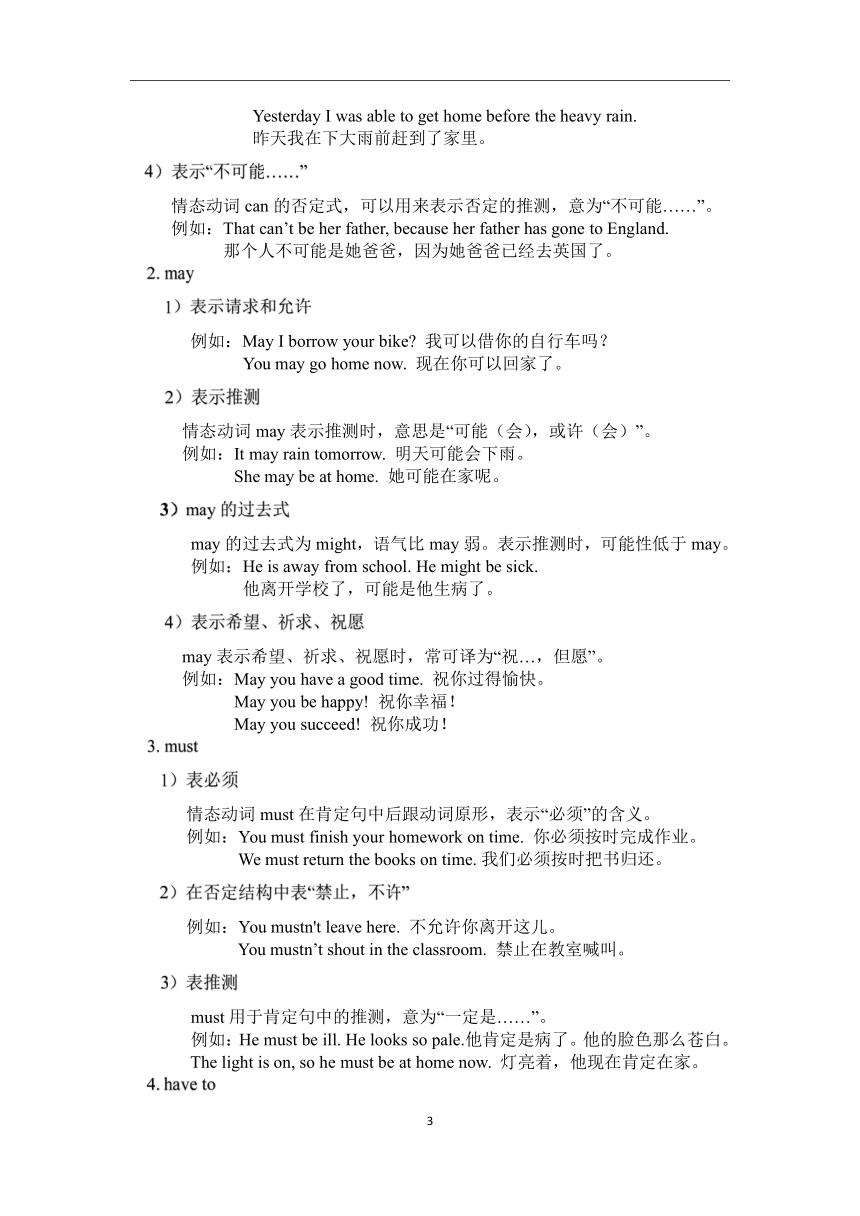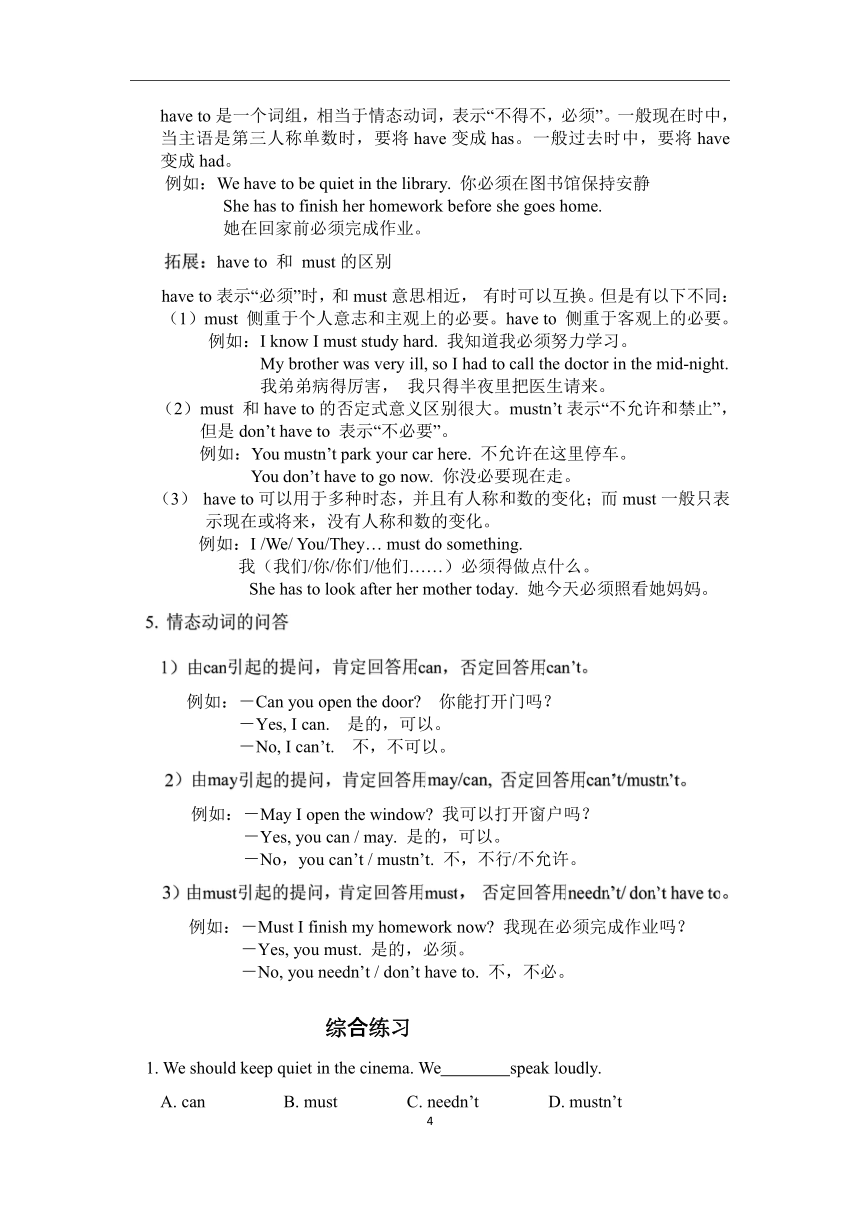【广东深圳】【沪教牛津版】【初一下英语】【Unit6 Electricity-语法讲义】含答案
文档属性
| 名称 | 【广东深圳】【沪教牛津版】【初一下英语】【Unit6 Electricity-语法讲义】含答案 |  | |
| 格式 | zip | ||
| 文件大小 | 470.2KB | ||
| 资源类型 | 教案 | ||
| 版本资源 | 牛津深圳版 | ||
| 科目 | 英语 | ||
| 更新时间 | 2021-05-16 12:17:17 | ||
图片预览




文档简介
1.
掌握本单元重点句型;
2.
掌握情态动词的概念及用法
语法
情态动词can/can
not
,
may
/may
not,
must/must
not
的基本用法。
can的用法。
表能力
We
can
do
our
homework
by
ourselves.
我们可以自己完成作业。
He
can
swim
well.
他游泳很好。
I
can
play
football
but
I
can’t
play
the
piano.
我会踢足球但是我不会弹钢琴。
2)表许可
You
can
watch
TV
after
supper.
晚饭后你可以看电视。
You
can’t
play
basketball
in
the
street.
你不能在街上打篮球。
表请求
Can
you
help
me
with
my
math?
你能帮我学数学吗?
Could
you
lend
your
book
to
me?
你能把你的书借给我吗?
注意:could
是can的过去式,但是这里并不表示过去时,而是表示委婉语气。
拓展:can
和be
able
to的区别
(1)情态动词can只有两种时态形式,现在式can和过去式could,而be
able
to有多种时态形式。在一般过去时中都表示能够时,两者可以互换。
例如:Mary
can
play
the
piano.
(一般现在时)
玛丽会弹钢琴。
She
could
/
was
able
to
play
the
piano
when
she
was
five.
(一般过去时)
她五岁时就会弹琴。
She
has
been
able
to
play
it
since
she
was
five.
(现在完成时)
她自从五岁起就会弹琴了。
(2)用在过去时中,could经常表示能够做某事,事实上不一定去做,而was
?were
able
to则表示“过去设法做成了某事”。在否定句中两者可通用。
例如:He
could
swim
across
the
English
Channel.
But
he
didn’t
want
to
do
it
that
day.
他能游过英吉利海峡,但那天他不想游。
Yesterday
I
was
able
to
get
home
before
the
heavy
rain.
昨天我在下大雨前赶到了家里。
表示“不可能……”
情态动词can的否定式,可以用来表示否定的推测,意为“不可能……”。
例如:That
can’t
be
her
father,
because
her
father
has
gone
to
England.
那个人不可能是她爸爸,因为她爸爸已经去英国了。
2.
may
1)表示请求和允许
例如:May
I
borrow
your
bike?
我可以借你的自行车吗?
You
may
go
home
now.
现在你可以回家了。
2)表示推测
情态动词may表示推测时,意思是“可能(会),或许(会)”。
例如:It
may
rain
tomorrow.
明天可能会下雨。
She
may
be
at
home.
她可能在家呢。
3)may的过去式
may的过去式为might,语气比may弱。表示推测时,可能性低于may。
例如:He
is
away
from
school.
He
might
be
sick.
他离开学校了,可能是他生病了。
4)表示希望、祈求、祝愿
may表示希望、祈求、祝愿时,常可译为“祝…,但愿”。
例如:May
you
have
a
good
time.
祝你过得愉快。
May
you
be
happy!
祝你幸福!
May
you
succeed!
祝你成功!
3.
must
1)表必须
情态动词must在肯定句中后跟动词原形,表示“必须”的含义。
例如:You
must
finish
your
homework
on
time.
你必须按时完成作业。
We
must?return
the
books
on
time.?我们必须按时把书归还。
2)在否定结构中表“禁止,不许”
例如:You
mustn't
leave
here.
不允许你离开这儿。
You
mustn’t
shout
in
the
classroom.
禁止在教室喊叫。
3)表推测
must用于肯定句中的推测,意为“一定是……”。
例如:He
must
be
ill.
He
looks
so
pale.他肯定是病了。他的脸色那么苍白。
The
light
is
on,
so
he
must
be
at
home
now.
灯亮着,他现在肯定在家。
4.
have
to
have
to是一个词组,相当于情态动词,表示“不得不,必须”。一般现在时中,当主语是第三人称单数时,要将have变成has。一般过去时中,要将have变成had。
例如:We
have
to
be
quiet
in
the
library.
你必须在图书馆保持安静
She
has
to
finish
her
homework
before
she
goes
home.
她在回家前必须完成作业。
拓展:have
to
和
must的区别
have
to表示“必须”时,和must意思相近,
有时可以互换。但是有以下不同:
(1)must
侧重于个人意志和主观上的必要。have
to
侧重于客观上的必要。
例如:I
know
I
must
study
hard.
我知道我必须努力学习。
My
brother
was
very
ill,
so
I
had
to
call
the
doctor
in
the
mid-night.
我弟弟病得厉害,
我只得半夜里把医生请来。
(2)must
和have
to的否定式意义区别很大。mustn’t表示“不允许和禁止”,但是don’t
have
to
表示“不必要”。
例如:You
mustn’t
park
your
car
here.
不允许在这里停车。
You
don’t
have
to
go
now.
你没必要现在走。
(3)
have
to可以用于多种时态,并且有人称和数的变化;而must一般只表示现在或将来,没有人称和数的变化。
例如:I
/We/
You/They…
must
do
something.
我(我们/你/你们/他们……)必须得做点什么。
She
has
to
look
after
her
mother
today.
她今天必须照看她妈妈。
5.
情态动词的问答
由can引起的提问,肯定回答用can,否定回答用can’t。
例如:-Can
you
open
the
door?
你能打开门吗?
-Yes,
I
can.
是的,可以。
-No,
I
can’t.
不,不可以。
2)由may引起的提问,肯定回答用may/can,
否定回答用can’t/mustn’t。
例如:-May
I
open
the
window?
我可以打开窗户吗?
-Yes,
you
can
/
may.
是的,可以。
-No,you
can’t
/
mustn’t.
不,不行/不允许。
3)由must引起的提问,肯定回答用must,
否定回答用needn’t/
don’t
have
to。
例如:-Must
I
finish
my
homework
now?
我现在必须完成作业吗?
-Yes,
you
must.
是的,必须。
-No,
you
needn’t
/
don’t
have
to.
不,不必。
综合练习
1.
We
should
keep
quiet
in
the
cinema.
We
speak
loudly.
A.
can
B.
must
C.
needn’t
D.
mustn’t
2.
—Mum,
I’ve
signed
for
the
box.
What’s
in
it?
—I’m
not
sure.
It
_____
be
a
present
from
your
uncle.
A
.
need
B.
must
C.
may
D.
will
3.
This
pair
of
glasses
______
be
Tony’s.
He’s
the
only
one
who
wears
glasses.
A.
must
B.
might
C.
can't
4.
—Mom,
I
visit
the
art
museum
next
Monday?
—I’m
afraid
you
can’t
.
All
museums
in
the
city
are
closed
on
Monday.
A.
would
B.
need
C.
should
D.
may
5.—Listen!
I
think
it
be
Mr.
White
singing
in
the
office.
—No.
It
be
him.
He
left
for
London
just
now.
A.
must;
mustn’t
B.
may;
mustn’t
C.
must;
can’t
D.
can;
can
6.—You
look
very
pretty,
if
I
say
so.
—Thanks
a
lot
for
saying
that.
must
B.
may
C.
will
D.
have
to
7.—I’ve
bought
all
the
food
for
the
party
tonight.
—Thank
you.
Then
I
go
to
the
supermarket.
A.
can’t
B.
mustn’t
C.
shouldn’t
D.
needn’t
8.—Excuse
me,
is
this
the
right
way
to
the
Children’s
Palace?
—Sorry,
I’m
not
sure.
But
it
be.
A.
mustn’t
B.
might
C.
can’t
D.
must
9.—Look!
Why
are
there
so
many
people?
—
There
are
some
policemen.
I
think
there
a
traffic
accident.
A.
must
have
B.
can
have
C.
is
going
to
be
D.
must
be
10.—I
saw
Mr.
White
in
his
office
just
now.
—No,
it
be
him.
He
has
Beijing
and
will
come
back
next
Friday.
A.
can’t;
gone
to
B.
can’t;
been
to
C.
mustn’t;
gone
to
D.
mustn’t;
been
to
11.
—
I
try
on
this
sweater
in
the
window?
—
It
is
just
on
show.
A.
Could;
Yes,
you
can.
B.
Can;
Sorry,
you
couldn’t
C.
Could;
Sorry,
you
can’t.
D.
Can;
Yes,
you
could.
—Doctor
Wang,
I’m
feeling
much
better.
Must
I
go
on
taking
the
medicine?
—No,
you
.
You’ll
get
well
soon.
A.
can’t
B.
mustn’t
C.
needn’t
13.
People
drive
after
drinking
alcohol(酒).
It’s
against
the
law.
A.
mustn’t
B.
needn’t
C.
couldn’t
D.
wouldn’t
答案:
1.
D.
2.
C.
3.
A.
5.
C.
6.
B.
7.
D.
8.
B.
9.
D.
10.
A.
11.
C.
12.
C.
13.
A.
I’m
sorry.
I
go
now.
My
father
is
waiting
for
me
outside.
A.
can
B.
may
C.
have
to
D.
could
2.
—Mum,
I
watch
TV
now?
—No,
you
.
You
_____finish
your
homework
first.
A.
May;
can’t;
must
B.
can;
can’t;
may
C.
must;
needn’t;
must
D.
may;
mustn’t;
can
3.
He
be
tired
now
after
working
for
ten
hours.
A.
have
to
B.
need
C.
must
D.
would
4.We
cannot
change
the
past.
You
it
again.
A.
had
not
better
say
B.
had
better
not
say
C.
had
better
not
to
say
D.
had
better
say
not
5.
The
doctor
told
him
that
he
really
give
up
drinking
because
of
his
poor
health.
A.
will
B.
may
C.
can
D.
should
6.
—Can
I
park
my
car
here?
—
.
There
is
so
much
traffic
here.
A.
Never
mind.
B.
You’d
better
not.
C.
Of
course
not.
D.
Yes,
please.
7.
Look
at
the
“No
parking”
sign.
You
park
your
car
here.
A.
should
B.
needn’t
C.
mustn’t
D.
need
8.In
some
countries,
people
download
music
from
the
Internet
without
paying
,
because
it
against
the
law.
A.
wouldn’t
B.
needn’t
C.
mustn’t
D.
couldn’t
9.
—Sixty
dollars
for
such
a
T-shirt!
You
be
joking!
—I’m
serious.
It’s
made
of
silk
from
Hangzhou.
A.
Must
B.
need
C.
will
D.
can
10.When
you
are
travelling,
bring
a
map
because
it
help
you.
A.
can’t
B.
mustn’t
C.
used
to
D.
may
11.—
____
I
make
a
phone
call
here,
Mr.
Chen?
—
No,
you
______,
but
you
_____make
a
phone
call
in
the
lounge(休息室).
A.
Must;
may
not
;
have
to
B.
May;
mustn’t;
can
C.
Should;
can’t;
may
D.
Must;
needn’t;
have
to
12.
—Have
you
got
the
results
of
the
exam?
—No.
All
we
do
now
is
to
wait.
A.
must
B.
can
C.
may
D.
could
13.
—
I
hand
in
the
report
today?
—No,
you
needn’t.
Can
B.
Must
C.
Shall
D.
Could
14.
?—Does?he?need?????
????there?at?once??
??—No,?he????
????leave?so?hurriedly?because?he?has?enough?time.??
A.?to?go;?doesn’t?need
B.?go;?needn’t
C.?to?go;?needn’t
?—Hi,?you?_____walk?on?the?grass.??
—Sorry,?I????
?????do?it?again.
A.
can’t?,?will?????
B.
needn’t,?won’t
C.
mustn’t,?won’t?
答案:
1.
C.
2.
A.
3.
C.
4.
B.
5.D.
6.
B.
7.C.
8.
C.
9.
A.
10.
D
11.
B.
13.
B.
14.
C.
15.
C.
语法
1.本单元重点语法情态动词的用法。
学生易错点整理:
—————————————————————————————————————————————————————————————————————————————————————————————————————————————————————————————————————————————————————————————————————————
16
掌握本单元重点句型;
2.
掌握情态动词的概念及用法
语法
情态动词can/can
not
,
may
/may
not,
must/must
not
的基本用法。
can的用法。
表能力
We
can
do
our
homework
by
ourselves.
我们可以自己完成作业。
He
can
swim
well.
他游泳很好。
I
can
play
football
but
I
can’t
play
the
piano.
我会踢足球但是我不会弹钢琴。
2)表许可
You
can
watch
TV
after
supper.
晚饭后你可以看电视。
You
can’t
play
basketball
in
the
street.
你不能在街上打篮球。
表请求
Can
you
help
me
with
my
math?
你能帮我学数学吗?
Could
you
lend
your
book
to
me?
你能把你的书借给我吗?
注意:could
是can的过去式,但是这里并不表示过去时,而是表示委婉语气。
拓展:can
和be
able
to的区别
(1)情态动词can只有两种时态形式,现在式can和过去式could,而be
able
to有多种时态形式。在一般过去时中都表示能够时,两者可以互换。
例如:Mary
can
play
the
piano.
(一般现在时)
玛丽会弹钢琴。
She
could
/
was
able
to
play
the
piano
when
she
was
five.
(一般过去时)
她五岁时就会弹琴。
She
has
been
able
to
play
it
since
she
was
five.
(现在完成时)
她自从五岁起就会弹琴了。
(2)用在过去时中,could经常表示能够做某事,事实上不一定去做,而was
?were
able
to则表示“过去设法做成了某事”。在否定句中两者可通用。
例如:He
could
swim
across
the
English
Channel.
But
he
didn’t
want
to
do
it
that
day.
他能游过英吉利海峡,但那天他不想游。
Yesterday
I
was
able
to
get
home
before
the
heavy
rain.
昨天我在下大雨前赶到了家里。
表示“不可能……”
情态动词can的否定式,可以用来表示否定的推测,意为“不可能……”。
例如:That
can’t
be
her
father,
because
her
father
has
gone
to
England.
那个人不可能是她爸爸,因为她爸爸已经去英国了。
2.
may
1)表示请求和允许
例如:May
I
borrow
your
bike?
我可以借你的自行车吗?
You
may
go
home
now.
现在你可以回家了。
2)表示推测
情态动词may表示推测时,意思是“可能(会),或许(会)”。
例如:It
may
rain
tomorrow.
明天可能会下雨。
She
may
be
at
home.
她可能在家呢。
3)may的过去式
may的过去式为might,语气比may弱。表示推测时,可能性低于may。
例如:He
is
away
from
school.
He
might
be
sick.
他离开学校了,可能是他生病了。
4)表示希望、祈求、祝愿
may表示希望、祈求、祝愿时,常可译为“祝…,但愿”。
例如:May
you
have
a
good
time.
祝你过得愉快。
May
you
be
happy!
祝你幸福!
May
you
succeed!
祝你成功!
3.
must
1)表必须
情态动词must在肯定句中后跟动词原形,表示“必须”的含义。
例如:You
must
finish
your
homework
on
time.
你必须按时完成作业。
We
must?return
the
books
on
time.?我们必须按时把书归还。
2)在否定结构中表“禁止,不许”
例如:You
mustn't
leave
here.
不允许你离开这儿。
You
mustn’t
shout
in
the
classroom.
禁止在教室喊叫。
3)表推测
must用于肯定句中的推测,意为“一定是……”。
例如:He
must
be
ill.
He
looks
so
pale.他肯定是病了。他的脸色那么苍白。
The
light
is
on,
so
he
must
be
at
home
now.
灯亮着,他现在肯定在家。
4.
have
to
have
to是一个词组,相当于情态动词,表示“不得不,必须”。一般现在时中,当主语是第三人称单数时,要将have变成has。一般过去时中,要将have变成had。
例如:We
have
to
be
quiet
in
the
library.
你必须在图书馆保持安静
She
has
to
finish
her
homework
before
she
goes
home.
她在回家前必须完成作业。
拓展:have
to
和
must的区别
have
to表示“必须”时,和must意思相近,
有时可以互换。但是有以下不同:
(1)must
侧重于个人意志和主观上的必要。have
to
侧重于客观上的必要。
例如:I
know
I
must
study
hard.
我知道我必须努力学习。
My
brother
was
very
ill,
so
I
had
to
call
the
doctor
in
the
mid-night.
我弟弟病得厉害,
我只得半夜里把医生请来。
(2)must
和have
to的否定式意义区别很大。mustn’t表示“不允许和禁止”,但是don’t
have
to
表示“不必要”。
例如:You
mustn’t
park
your
car
here.
不允许在这里停车。
You
don’t
have
to
go
now.
你没必要现在走。
(3)
have
to可以用于多种时态,并且有人称和数的变化;而must一般只表示现在或将来,没有人称和数的变化。
例如:I
/We/
You/They…
must
do
something.
我(我们/你/你们/他们……)必须得做点什么。
She
has
to
look
after
her
mother
today.
她今天必须照看她妈妈。
5.
情态动词的问答
由can引起的提问,肯定回答用can,否定回答用can’t。
例如:-Can
you
open
the
door?
你能打开门吗?
-Yes,
I
can.
是的,可以。
-No,
I
can’t.
不,不可以。
2)由may引起的提问,肯定回答用may/can,
否定回答用can’t/mustn’t。
例如:-May
I
open
the
window?
我可以打开窗户吗?
-Yes,
you
can
/
may.
是的,可以。
-No,you
can’t
/
mustn’t.
不,不行/不允许。
3)由must引起的提问,肯定回答用must,
否定回答用needn’t/
don’t
have
to。
例如:-Must
I
finish
my
homework
now?
我现在必须完成作业吗?
-Yes,
you
must.
是的,必须。
-No,
you
needn’t
/
don’t
have
to.
不,不必。
综合练习
1.
We
should
keep
quiet
in
the
cinema.
We
speak
loudly.
A.
can
B.
must
C.
needn’t
D.
mustn’t
2.
—Mum,
I’ve
signed
for
the
box.
What’s
in
it?
—I’m
not
sure.
It
_____
be
a
present
from
your
uncle.
A
.
need
B.
must
C.
may
D.
will
3.
This
pair
of
glasses
______
be
Tony’s.
He’s
the
only
one
who
wears
glasses.
A.
must
B.
might
C.
can't
4.
—Mom,
I
visit
the
art
museum
next
Monday?
—I’m
afraid
you
can’t
.
All
museums
in
the
city
are
closed
on
Monday.
A.
would
B.
need
C.
should
D.
may
5.—Listen!
I
think
it
be
Mr.
White
singing
in
the
office.
—No.
It
be
him.
He
left
for
London
just
now.
A.
must;
mustn’t
B.
may;
mustn’t
C.
must;
can’t
D.
can;
can
6.—You
look
very
pretty,
if
I
say
so.
—Thanks
a
lot
for
saying
that.
must
B.
may
C.
will
D.
have
to
7.—I’ve
bought
all
the
food
for
the
party
tonight.
—Thank
you.
Then
I
go
to
the
supermarket.
A.
can’t
B.
mustn’t
C.
shouldn’t
D.
needn’t
8.—Excuse
me,
is
this
the
right
way
to
the
Children’s
Palace?
—Sorry,
I’m
not
sure.
But
it
be.
A.
mustn’t
B.
might
C.
can’t
D.
must
9.—Look!
Why
are
there
so
many
people?
—
There
are
some
policemen.
I
think
there
a
traffic
accident.
A.
must
have
B.
can
have
C.
is
going
to
be
D.
must
be
10.—I
saw
Mr.
White
in
his
office
just
now.
—No,
it
be
him.
He
has
Beijing
and
will
come
back
next
Friday.
A.
can’t;
gone
to
B.
can’t;
been
to
C.
mustn’t;
gone
to
D.
mustn’t;
been
to
11.
—
I
try
on
this
sweater
in
the
window?
—
It
is
just
on
show.
A.
Could;
Yes,
you
can.
B.
Can;
Sorry,
you
couldn’t
C.
Could;
Sorry,
you
can’t.
D.
Can;
Yes,
you
could.
—Doctor
Wang,
I’m
feeling
much
better.
Must
I
go
on
taking
the
medicine?
—No,
you
.
You’ll
get
well
soon.
A.
can’t
B.
mustn’t
C.
needn’t
13.
People
drive
after
drinking
alcohol(酒).
It’s
against
the
law.
A.
mustn’t
B.
needn’t
C.
couldn’t
D.
wouldn’t
答案:
1.
D.
2.
C.
3.
A.
5.
C.
6.
B.
7.
D.
8.
B.
9.
D.
10.
A.
11.
C.
12.
C.
13.
A.
I’m
sorry.
I
go
now.
My
father
is
waiting
for
me
outside.
A.
can
B.
may
C.
have
to
D.
could
2.
—Mum,
I
watch
TV
now?
—No,
you
.
You
_____finish
your
homework
first.
A.
May;
can’t;
must
B.
can;
can’t;
may
C.
must;
needn’t;
must
D.
may;
mustn’t;
can
3.
He
be
tired
now
after
working
for
ten
hours.
A.
have
to
B.
need
C.
must
D.
would
4.We
cannot
change
the
past.
You
it
again.
A.
had
not
better
say
B.
had
better
not
say
C.
had
better
not
to
say
D.
had
better
say
not
5.
The
doctor
told
him
that
he
really
give
up
drinking
because
of
his
poor
health.
A.
will
B.
may
C.
can
D.
should
6.
—Can
I
park
my
car
here?
—
.
There
is
so
much
traffic
here.
A.
Never
mind.
B.
You’d
better
not.
C.
Of
course
not.
D.
Yes,
please.
7.
Look
at
the
“No
parking”
sign.
You
park
your
car
here.
A.
should
B.
needn’t
C.
mustn’t
D.
need
8.In
some
countries,
people
download
music
from
the
Internet
without
paying
,
because
it
against
the
law.
A.
wouldn’t
B.
needn’t
C.
mustn’t
D.
couldn’t
9.
—Sixty
dollars
for
such
a
T-shirt!
You
be
joking!
—I’m
serious.
It’s
made
of
silk
from
Hangzhou.
A.
Must
B.
need
C.
will
D.
can
10.When
you
are
travelling,
bring
a
map
because
it
help
you.
A.
can’t
B.
mustn’t
C.
used
to
D.
may
11.—
____
I
make
a
phone
call
here,
Mr.
Chen?
—
No,
you
______,
but
you
_____make
a
phone
call
in
the
lounge(休息室).
A.
Must;
may
not
;
have
to
B.
May;
mustn’t;
can
C.
Should;
can’t;
may
D.
Must;
needn’t;
have
to
12.
—Have
you
got
the
results
of
the
exam?
—No.
All
we
do
now
is
to
wait.
A.
must
B.
can
C.
may
D.
could
13.
—
I
hand
in
the
report
today?
—No,
you
needn’t.
Can
B.
Must
C.
Shall
D.
Could
14.
?—Does?he?need?????
????there?at?once??
??—No,?he????
????leave?so?hurriedly?because?he?has?enough?time.??
A.?to?go;?doesn’t?need
B.?go;?needn’t
C.?to?go;?needn’t
?—Hi,?you?_____walk?on?the?grass.??
—Sorry,?I????
?????do?it?again.
A.
can’t?,?will?????
B.
needn’t,?won’t
C.
mustn’t,?won’t?
答案:
1.
C.
2.
A.
3.
C.
4.
B.
5.D.
6.
B.
7.C.
8.
C.
9.
A.
10.
D
11.
B.
13.
B.
14.
C.
15.
C.
语法
1.本单元重点语法情态动词的用法。
学生易错点整理:
—————————————————————————————————————————————————————————————————————————————————————————————————————————————————————————————————————————————————————————————————————————
16
